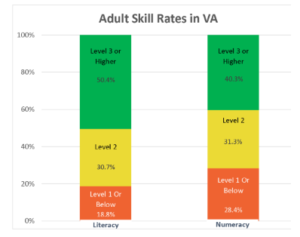Connecting Community-Based Literacy Programs to Research

by Margaret Patterson, Ph.D.
“Adult education generally sees limited funding for research, despite a huge need for services, so connecting research that is available with practice is vital (Kreil, 2018; Patterson, 2016).”
Imagine a director of a community-based literacy organization (CBLO) who wants to find out “what works” for adult learners coming to the CBLO to learn math and numeracy skills. The director probably has some tried-and-true approaches for math tutoring or some favorite curricula from major vendors. The director may have heard a buzz in professional development sessions about the value of “research-based models” for teaching adults but isn’t sure how to find credible research on adult numeracy. And, implementing research results into practice seems daunting. Tutors may think research is vague, inconclusive, or too difficult to apply (Kreil, 2018; Patterson, 2016). Where can the director even start?
Why Research Matters
Adult education generally sees limited funding for research, despite a huge need for services, so connecting research that is available with practice is vital (Kreil, 2018; Pat- terson, 2016). Many in adult education do not turn to research for practice (Patterson, 2016). Finding research can also be challenging. With limited funding for dissemination, researchers tend to write journal papers rather than develop materials for practitioners or for professional developers (Smith, 2016).
A need for services is apparent in how many phone calls CBLOs get from prospective adult learners, not to mention a constant search for tutors. Can research help quantify the need— and provide persuasive evidence to potential funders? In Virginia, specifically, Programme for International Assessment of Adult Competencies (PIAAC) data from a nationally representative largescale survey indicate about 60% of the adult population struggles with basic numeracy skills (see orange and yellow sections in the right bar of the figure). PIAAC counts and percentages on adult skills and demographics are also available by county in the PIAAC Skills Map and can be very informative to potential funders or media sources who want to know what a CBLO faces (see links section that follows).

National Center for Education Statistics
Finding Research
Three useful places for CBLOs to search for research online are Google Scholar, ERIC, and LINCS resources. Returning to the scenario about the CBLO director, an example search for “Adult Numeracy Tutoring Virginia” in Google Scholar yields 528 results since 2020. Although searching is free and some PDF papers are available for free download, many papers may be in published journals that charge a fee, so checking with a community or postsecondary library for access may be fruitful.
In ERIC, a U.S. Department of Education website, searching for “Adult Numeracy” and selecting peer reviewed, full text available, and since 2020 yields 11 reports. Research that is peer reviewed has undergone review by researchers and editors to help ensure reports are as complete and credible as possible.
On LINCS, another federal repository, a search for “math and numeracy” yields 105 results. Not all LINCS resources are research reports, but filtering for research is possible (see links section that follows).
Another place to look for research is directly in an adult education journal. Several journals affiliated with professional associations include:
These journals provide peer-reviewed research and practice papers. Access is often included in membership fees and is another benefit of joining a professional association.
Also, at state and national conferences, researchers present and interpret findings for practice. If a CBLO has staff or tutors attending a conference, they could sit in on a research session and ask a researcher who is presenting to recommend reports on a particular topic.
Evaluating Research
Just as tutors seek to teach adult learners to think critically, evaluating research critically is useful to CBLO staff and tutors. In reviewing adult education research reports, they can consider six questions (for more in-depth explanation, see Patterson, 2016):
- Overarching Question: What main question prompted the research?
- Assumptions: What assumptions did researchers make about the program, activity, or population researched?
- Audience: Who is the audience for the research? Were their concerns and questions addressed in the report?
- Effectiveness of Programs or Activities: What is presented about how the program or activity was implemented? How does the report explain the effectiveness and costs of a program or activity?
- Validity Threats: Did researchers draw realistic conclusions from the collected data? How widely do results generalize?
- Usefulness: How does the research relate to learner outcomes?
CBLOs may also want to consider starting a tutor study circle to search for, download, and evaluate research. The study circle could meet monthly, perhaps before or after tutor training sessions. Employing the six questions, it could consider the merits of research and how results could benefit adult learners.
Links to Resources
ERIC (“Adult Numeracy” example)
Google Scholar Adult Numeracy Tutoring Virginia (example)
LINCS (“Math and Numeracy” example)
PIAAC Skills Map state and county-specific data
References
Kreil, J. L. (2018). Becoming an Expert through the Process of Professionalization:
A Case Study of an Adult Basic Education Licensure Program [Doctoral dissertation, University of Minnesota]. https://conservancy.umn.edu/ bitstream/handle/11299/199056/Kreil_ umn_0130E_19229.pdf?sequence=1
Patterson, M. B. (2016). Research to practice connections. Journal of Research and Practice for Adult Literacy, Secondary, and Basic Education, 5(3), 30-34. https:// coabe.org/wp-content/uploads/2019/09/ Winter2016JournalFINALELECTRONIC.pdf#page=32
Smith, C. (2016). The role of professional development in bridging research and practice in adult literacy and basic education. Journal of Research and Practice for Adult Literacy, Secondary, and Basic Education, 5(3), 40-42. https:// coabe.org/wp-content/uploads/2019/09/ Winter2016JournalFINALELECTRONIC. pdf#page=42

Dr. Margaret Patterson of Research Allies for Lifelong Learning (www. researchallies.org) in Vienna, VA, partners with non-profits, postsecondary institutions, and state agencies to apply research to support adult educators and learners. Previously, she served in state and national research leadership positions. She taught adult education in Nebraska, Nevada, Kansas, and Virginia and presents throughout the United States.